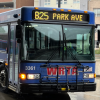In past years, some parents might have worried that their child would bring their college roommate home with them for Thanksgiving. This year, Gov. Charlie Baker said, public health experts and state officials are "very concerned" that college students might bring COVID-19 home for the holiday.
"Today we're urging everybody to make a difficult choice this Thanksgiving. If we treat this year just like we treat every other Thanksgiving, it's quite likely that it will trigger a significant spread. And we know that that leads to serious illness for many and in rare cases death, especially among our senior citizens," the governor said.
The safest way to celebrate Thanksgiving this year is with only members of your immediate household, Baker said. "Any group gathering beyond this poses a significant chance of spreading the virus," he said, adding that the Department of Public Health has made Thanksgiving-specific guidelines available at mass.gov/thanksgiving2020 .
Baker said Massachusetts wants colleges and universities to make testing available to all students planning to leave campus for Thanksgiving within 72 hours of their departure. If a student tests positive, they should isolate in university housing for COVID-positive students, Baker said.
The guidelines for higher education institutions were "designed to ensure students are leaving campus, where they're often in communal spaces and with peers, free of the virus," he said.
"Hopefully it'll help prevent thousands of students from traveling around the state and over state lines to potentially infect their family members and loved ones with this virus when they return home," Baker said.
Secretary of Health and Human Services Marylou Sudders said an automated message from Public Health Commissioner Monica Bharel will be sent to 4.5 million phone lines in Massachusetts on Thursday "reminding residents of the increased risk of contracting and spreading COVID-19 over the coming holiday season."
She also ticked off a list of things people should avoid this Thanksgiving: avoid sharing food and drink, avoid shaking hands or hugging, and avoid singing, dancing, and shouting.
"I know there's a lot of 'avoids' in this," Sudders said. She added, "I know that for many families across the state, this guidance dramatically impacts long-standing family traditions and is devoid of human interaction we have all been missing since March, but it's crucial that we follow Department of Public Health and CDC guidance to help stop the spread of COVID-19 in our communities."
Responding to a question about long lines at free COVID-19 testing sites around the state, Baker said he had watched some news coverage of the issue and was struck by just how many people waiting in line said they were getting tested before traveling for Thanksgiving.
"Part of what I'm concerned about here is it's pretty clear based on those lines that a lot of people are going to travel over the holidays," he said. "And there's not much at this point that we can do other than say we think that's not a great idea and encourage people, if they do do that, to recognize and understand that a test is not like a Kevlar vest, OK? It's a moment in time."
Baker also reminded people of the state's 10-person limit for private indoor gatherings, its restrictions on travelers from all states but Maine, New Hampshire, Vermont and Hawaii, its stay-at-home advisory and mask-wearing guidance. Sudders said that she expects "two of our neighboring states will be added to high-risk states" when the list is updated Friday.
"And at this point, folks should be going to school, or to work, and going home," the governor said. "And if people abide by these very simple rules and concepts and do it consistently, they can allow us to keep everything open, our schools and our economy. And it can give us the kind of holiday season that I think everybody is hoping for."
Rep. Tami Gouveia seized upon Baker's comment while he was still at the lectern to make a point about the dichotomy between Baker's comments and the reality that many businesses, including some that were previously considered "non-essential," remain open.
"So confusing why @MassGovernor says that we should only go to work and school, but then allows gyms and restaurants to be open. Anyone have a logical explanation?" the Acton Democrat
tweeted
.



